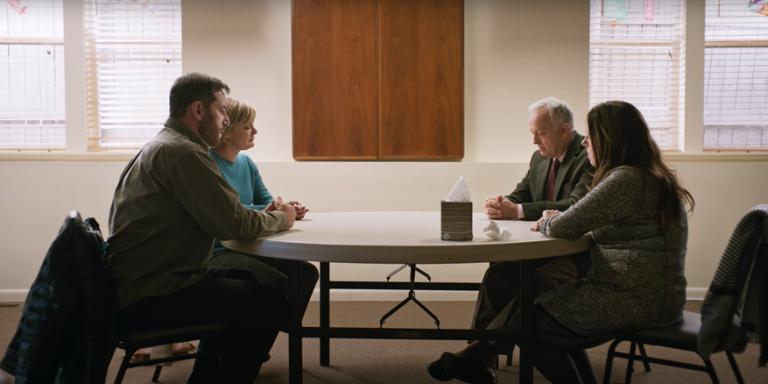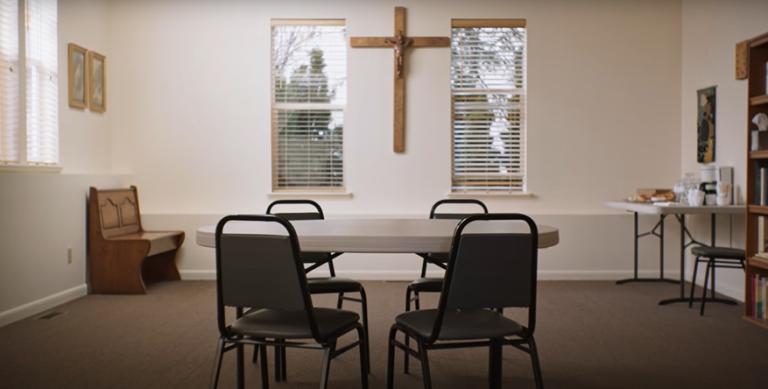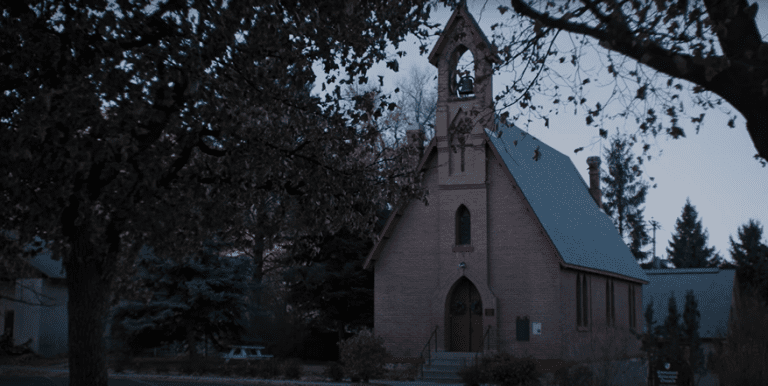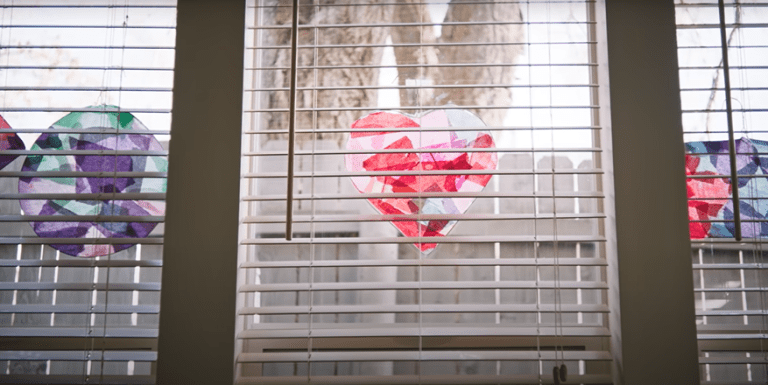
Mass, opening nationally Oct. 22, isn’t always easy to watch. But then again, few worthwhile things are easy.
Mass takes place almost entirely in the confines of a church—just one room in that church, in fact. Four people spend an afternoon talking about an unimaginable tragedy: Gail and Jay (played by Martha Plimpton and Jason Isaacs) lost their son in a school shooting. Linda and Richard (Ann Dowd and Reed Birney) raised the killer.
The film, directed by first-time director Franz Kranz and distributed by Bleecker Street, takes us through the four parents’ anger and shame, grief and confusion. It’s a master class in empathy, asking us to understand each of these four very different people.
Jay and Gail desperately want Linda and Richard to explain Hayden to them: What was he like growing up? When did he go wrong? Did they see? Could they have done more to stop him? Gail and Jay know most of Hayden’s, of course. The media covered the story exhaustively, as you might imagine. And for years, the couple tried to glean every bit of information they could. But they want to hear it again—learn a little detail, hear about a little moment, that would suddenly make Hayden’s mindset a bit clearer, a bit more understandable. For years, they’ve been asking the same question: Why?
They say they don’t blame Linda and Richard, of course … but they do. And they have company. Linda and Richard blame themselves, too.
“Why not speak [at the time]?” Richard says, his normally stony visage showing cracks. “Because I didn’t have an answer. Why not help to prevent this from happening again? Because I don’t know how.”
But underneath that why—why did this boy kill?—there’s a deeper why, even more vexing, even more unanswerable. Why did my boy die?

The Unanswerable
Mass asks an inherently spiritual question, and one that hits, and hurts, deeply if you’re a Christian. Despite all the suffering we read about in the Bible, most of us feel that when we decide to follow Christ, we’re signing a contract with God. We will follow You. We will work for You. And in return, You will protect us. You will love us, and that love means You will save us from the world’s terrors. It even has Scriptural backing. “For I know the plans I have for you, declares the Lord, plans for welfare and not for evil, to give you a future and a hope.” (Jeremiah 29:11-12)
That Scripture weighs heavy in Mass, which takes place in this plain, multifunction church room. The sense of church is everywhere. A church worker bustles with awkward well-meaning. A piano student plays halting hymns in the sanctuary. Even the secular therapist that Jay and Gail go to—one apparently entering the church in question for the first time—wears a black outfit with a white scarf draped over the shoulders, looking very much like a priest in somber vestments.
And above the table the two couples meet at, we see a crucifix holding a dying Christ. One murdered, but whose death held meaning. Can such meaning be found in such a meaningless tragedy?
Finally, Gail gets to the painful, throbbing nerve—the why of all whys. “I made a promise [to my son]—a promise to him that I can’t keep! I promised him that his life would mean something. That it wouldn’t be in vain.”
We’re smacked with renewed knowledge of how young he was. How young they all were.
When Gail mourns over her lost promise—the promise she made to her son that his life would mean something—Linda gently asks Gail to tell her a story about their boy. About Evan. And Gail does. She cries and smiles and becomes as animated as we’ve seen her—the memory of Evan filling her up again.
And the answer comes, unspoken. Evan’s life did mean something.
“Let him rest,” Linda says. “Evan doesn’t have to change the world.”

Moving Past the Past
I was a religion reporter for a daily newspaper for a number of years, and I’ve talked with a lot of people who’ve suffered unimaginable pain. As a Christian, but, sometimes, not a very good Christian, I’ve always found that collision point between pain and faith to be fascinating … and perplexing. We live our lives in the cup of a loving God, we believe. So why does He allow such terrible things to happen? Why does He allow them to happen to us?
And the question comes again: Why.
God rarely answers such questions. Perhaps we might see the answer, if we live long enough. But I don’t think we all see, in this lifetime, such tidy resolutions to our pain.
The whys are always there in our lives, I think. We all suffer pain, though few in the magnitude we see in Mass. And when that pain is a product of someone else’s decision—born of hurt or anger or just plain evil—we want justice. We need it. We cry out for something, anything, to make it better.
That’s a good thing, this desire for justice. But in this fallen world, it can be difficult to find.
But Jesus showed us that, even without perfect understanding, without perfect justice, we can still find a way forward—to bind up our wounds and push on. It’s a simple thing, but it’s almost impossibly difficult sometimes, too. Forgiveness.
Gail makes a startling confession toward the end of the film—that if she held out forgiveness to Linda and Richard, she’d somehow lose Evan again. That she’d betray him and the memory of him.
“But maybe I just needed to be with you because I know now,” Gail says. “I forgive you. I do. I have … And I have to tell you I also forgive Hayden for what he did … I forgive him because I can’t live this way anymore.”

Letting Go
In Psalm 147, we’re told that God “heals the brokenhearted and binds up their wounds.” It doesn’t happen right away. But when we’re all tied up in anger and bitterness, I’m not sure if it can happen at all. We can hold so tightly to all our pain–as if that pain is what’s keeping us alive. But in the Bible, we’re told to lay our burdens down. “I will give you rest.”
Sometimes the burden that hurts us the most is the hardest to lay down.
Linda wears a cross around her neck, but none of the main participants seem particularly devout, despite where they meet. Jay confesses that he’s not religious at all, and indeed can seem downright hostile to Christianity. He says the Church’s response made him “so angry,” and he rails against the church they’re meeting in. “Trust the Catholic Church to come up with the most bankrupt response,” he says, gesturing around him—before being told that the facility actually Episcopalian.
But by the time the film has run its course, something has changed. Jay hears the choir practicing in the sanctuary. He asks, almost in a trance, what he’s hearing. And when someone asks him if the choir should stop, he says no. Tears fill his eyes as he listens.
Evan is still gone. The loss, the pain, the grief are still there. But in that modest room in this modest church, God took away some bitter burdens. And those tears, I think, might just water a better tomorrow.













